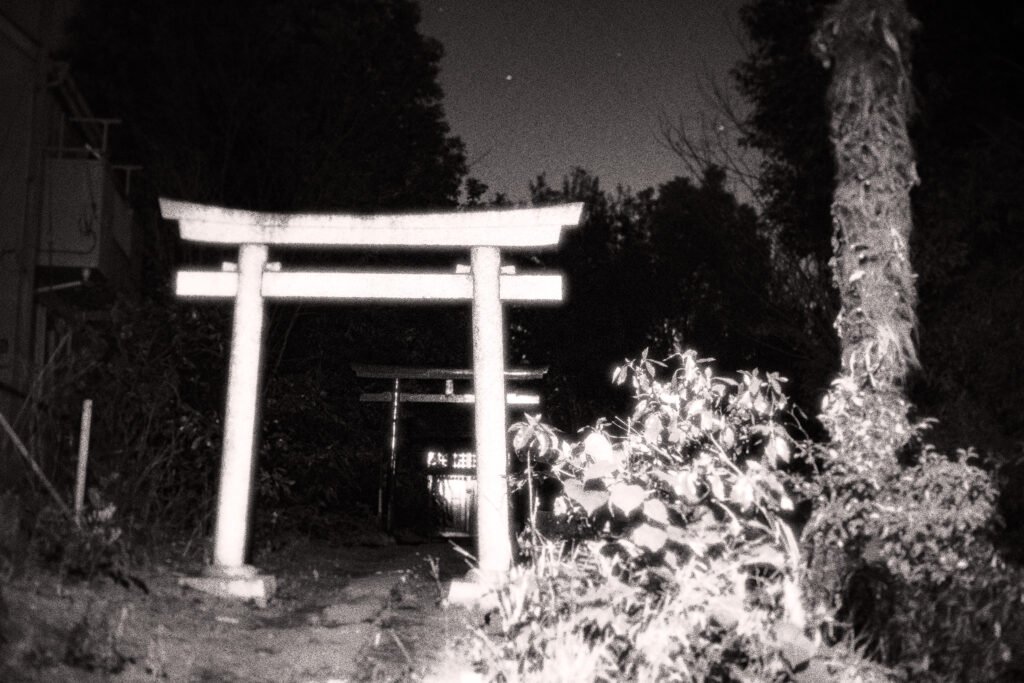On a cool spring night, I was on a mountain road in Yamanashi well after dark. I had gone out to try to photograph star trails over nearby peaks, but ended up just taking a walk, as there was a fog settling over everything that obscured the view.
There were no street lights within a kilometer, and only a half-moon’s worth of illumination from the sky. The air was still, and the only sounds came from the small frogs in the rice paddies and the roadside gravel under my feet.
At one point, just after I had paused to enjoy the serenity of it all, a shiver went up my spine and my hair stood on end. With my flashlight, I scanned the surrounding area. With the beam attenuated by the fog, I couldn’t see much, but across a rice paddy, I saw two small points of light coming back, presumably reflectors on a farmer’s fence posts.
And then they blinked.
It was only a deer, an animal I’ve seen thousands of in my life. I was in no danger, but those eyes coming out of the darkness spooked me all the same, and it seemed a good time to head back to the cabin.
There’s plenty about this universe of ours that is beyond my understanding, and while I don’t believe in the supernatural, I suppose I don’t rule it out entirely. Call me paranormal-agnostic, I guess. Even so, if there’s anywhere in the world that I’d be more inclined to believe is at least a little haunted, it’s Japan.
Japanese folklore is chock full of yōkai,1 fantastical creatures and spirits of a staggering variety. Perhaps most well known among them is the kappa, a mischievous aquatic creature that, among other things, will lure people into the water to drown them. There are also onibi, literally demon fire, floating orbs of heatless fire that will swarm their victims and drain their life force. And who doesn’t love rokurokubi, ordinary women who have been cursed to have their heads wander around at night at the end of greatly elongated necks to scare people and consume lamp oil?
These are all, of course, simply legends, and I do not believe in the existence of these creatures. But there have been many times in the last decade where strange feelings, unexpected sounds, and things glanced from the corner of the eye have given me pause. It’s almost always been in a natural setting, whether up in the mountains, an overgrown lot next to an abandoned house, or a tract of forest abutting a road. And even when I can quickly establish what’s going on, a peculiar feeling remains.
Somehow, it’s on the grounds of temples and shrines where this happens least, even around the cemeteries often found at temples. Perhaps the yōkai fear to tread on holy ground or wish to avoid the enshrined kami.2 On the occasion that I find myself a bit spooked and there is a shrine nearby, I pay it a visit. Passing through the torii gate feels like passing over a threshold into a different realm, over a border into a space where the rules of existence seem at least a little more clearly defined.
There have been plenty of times I’ve stood there in the dark at a shrine, utterly deserted in the dead of night, and felt a sort of vacuum form around me. Dead quiet, a distinct absence of distress, and nothing nefarious lurking in nearby shadows. And I don’t know if this is something others feel in these places, or if it’s just something my mind has invented, but the subjective difference is sincerely there.
So if you’re wandering somewhere in Japan late at night and find yourself feeling a bit spooked, maybe stop by a shrine and see if that helps. Just don’t be surprised if you find me standing there, eyes closed, vibing with the peace I’ve found.
-
”the deities, divinities, spirits, mythological, spiritual, or natural phenomena that are venerated in the Shinto religion,” see: https://en.wikipedia.org/wiki/Kami ↩︎


